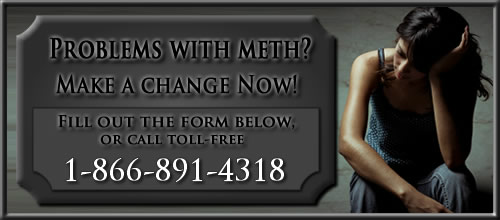Meth Abuse
- Meth Abuse Symptoms
- Meth Abuse Facts
- Meth Abuse Side Effects
- Meth Abuse Withdrawal
- Meth Abuse Statistics
- Meth Abuse Overdose
- Meth Abuse Detox
- Meth Abuse Treatment
- Abuse of Crystal Meth
- Meth Rehab
- Meth Abuse Photos
- Teenage Meth Abuse
Meth Abuse Information

Meth Abuse Symptoms
 Meth abuse symptoms, if taken in large doses include irritability, aggressive behavior, anxiety, excitement, auditory hallucinations, and paranoia along with delusions and psychosis. Meth abusers tend to be violent. Mood changes are also common, and the abuser can rapidly change from friendly to hostile. The paranoia produced by meth abuse results in suspiciousness, hyperactive behavior, and dramatic mood swings.
Meth abuse symptoms, if taken in large doses include irritability, aggressive behavior, anxiety, excitement, auditory hallucinations, and paranoia along with delusions and psychosis. Meth abusers tend to be violent. Mood changes are also common, and the abuser can rapidly change from friendly to hostile. The paranoia produced by meth abuse results in suspiciousness, hyperactive behavior, and dramatic mood swings.
Meth appeals to drug abusers because it increases the body's metabolism and produces euphoria, increases alertness, and gives the abuser a sense of increased energy. High doses or chronic use of meth, however, increases nervousness, irritability, and paranoia. The extreme paranoia that meth abusers can experience is often associated with a distorted tendency toward violence. Adverse meth abuse symptoms include the risk of stroke, heart failure, and prolonged psychosis.
Short term meth abuse symptoms are increased alertness, sense of well-being, paranoia, intense high, hallucinations, aggressive behavior, increased heart rate, convulsions, extreme rise in body temperature (as high as 108 degrees which can cause brain damage and death), uncontrollable movements (twitching, jerking, etc...), violent behavior, insomnia, impaired speech, dry and itchy skin, premature aging, rotting teeth, loss of appetite, acne, sores and numbness.
Some of the effects that meth use has on the mind are also meth abuse symptoms. These meth abuse symptoms include disturbed sleep, excessive excitation, excessive talking, panic, anxiousness, nervousness, moodiness and irritability, false sense of confidence and power, delusions of grandeur leading to aggressive behavior, uninterested in friends, sex, or food, aggressive and violent behavior, and severe depression.
Early Meth Abuse Symptoms and Signs
- Euphoric "high" state (excessively happy)
- Paranoia
- Decreased appetite
- Increased physical activity
- Anxiety, shaking hands, nervousness Incessant talking
- Rapid eye movement
- Increased body temperature (can rise as high as 108 degrees and cause death)
- Dilated pupils
- Sweating not related to physical activity
Continued Meth Abuse Symptoms and Signs Include the Above Symptoms, Plus:
- Weight loss
- Strong body odor
- Shadows under the eyes
- Dry or itchy skin
- Pale complexion
- Acne/Acne-type sores
- Irritable and moody (mood swings)
- Picking at skin or hair
- Aggressive or violent behavior
- Depression (withdrawal/tolerance effect)
- Severe nail biting
- Nose bleeds, nasal perforations
- Dermatitis around the mouth
- Lack of personal hygiene
Advanced Meth Abuse Symptoms and Signs Include the Above Symptoms, Plus:
- Extreme weight loss
- Hair loss
- Discolored, rotten or missing teeth
- Corneal ulcerations
- Severe mental illness symptoms, similar to schizophrenia (including anger, panic, paranoia, auditory and visual hallucinations, repetitive behavior patterns)
Meth Abuse Symptoms of an Overdose -A toxic reaction (or overdose) can occur at relatively low levels, 50 milligrams of pure meth for a non-tolerant user. Metabolic rates vary from person to person, and the strength of the meth varies from batch to batch, so there is no way of stating a "safe" level of use. Because stimulants affect the body's cardiovascular and temperature-regulating systems, physical exertion increases the hazards of meth use.
Meth Abuse Symptoms of Overdose
- High fever
- Chest pain
- Rapid breathing
- Sudden, dangerous increase in blood pressure
- Profuse sweating
- Chances of heart attack, stroke, or coma Convulsions Tremors
- Confusion
- Dangerous rise in body temperature
- Seeing spots (due to pressure on the nerves of eye)
- Cardiovascular collapse
